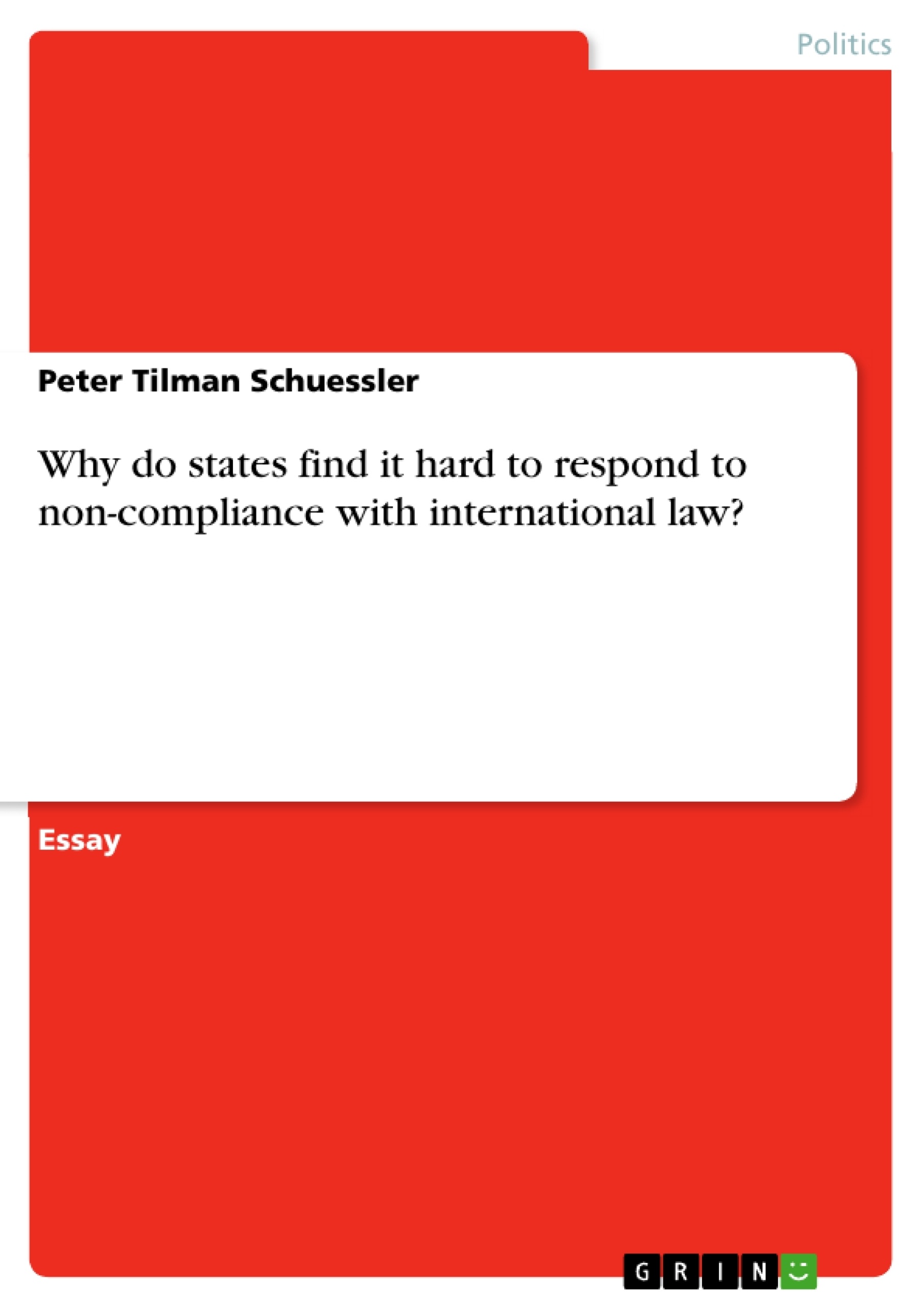This essay will show how complex it is for states to react to non-compliance, that will mean the violation of treaties. The reasons for difficulty in replying to breaches of international law1 are based on three main factors: States will respond if they have the interest, legitimacy of response and the power to act. If one of these points is missing, a country will find it hard to act. However in most cases there will be a reaction, even if this is seen only in the articulation of protest. Nevertheless, serious measures like an embargo, or an intervention to pursue a punishment or the reinstatement of order, depend on the previous factors. Firstly we shall deal with the question of legitimacy, secondly with the connection of interest and hierarchy of states; and finally, the interlinkages between these factors will be demonstrated by means of examples.
It is important for states in order to justify their move to their own population and to maintain international reputation, to have a legitimacy to react. Therefore it is necessary that the breach of the law occurred intentionally, is proven, and the reaction to the breach does not itself contradict international law. In the following these three ideas will be explained.
Inhaltsverzeichnis (Table of Contents)
- Essay
- Legitimacy
- Interest and Hierarchy of States
- Interlinkages Between the Factors
Zielsetzung und Themenschwerpunkte (Objectives and Key Themes)
This essay explores the complexities of state responses to non-compliance with international law, specifically focusing on treaty violations. It aims to demonstrate the factors influencing state responses and highlights the importance of legitimacy, national interest, and power dynamics in shaping these actions.
- The Role of Legitimacy in Responding to Treaty Violations
- The Importance of National Interest in Shaping State Responses
- Power Dynamics and the Hierarchy of States in International Relations
- The Interrelationship Between Legitimacy, Interest, and Power in Determining State Actions
- The Challenges of Enforcing International Law in the Absence of a Global Executive Power
Zusammenfassung der Kapitel (Chapter Summaries)
- Essay: This introductory section establishes the essay's focus on the complexities of state responses to non-compliance with international law, particularly treaty violations. It outlines the three key factors influencing state actions: legitimacy, interest, and power.
- Legitimacy: This section delves into the importance of legitimacy in justifying state responses to treaty breaches. It emphasizes the need for proven intentional violations, verifiable implementation of treaties, and ensuring that the response itself does not contradict international law. The discussion highlights the complexities of treaty supervision and the potential for conflicting interpretations of international law.
- Interest and Hierarchy of States: This section explores the role of national interest and power dynamics in shaping state responses. It examines the challenges of enforcing international law in the absence of a global executive power and highlights the tendency of states to prioritize self-interest over collective action. Examples like the Falklands War and the Italian invasion of Abyssinia illustrate the impact of national interest on state responses.
- Interlinkages Between the Factors: This section emphasizes the interrelationship between legitimacy, interest, and power in determining state actions. It argues that effective responses are more likely when these factors align and provides examples like the Persian Gulf Crisis to support this claim. The discussion also highlights the influence of powerful states and the potential for imbalances in the international system.
Schlüsselwörter (Keywords)
This essay focuses on the complexities of state responses to non-compliance with international law, highlighting key concepts such as international law, treaty violations, legitimacy, national interest, power dynamics, hierarchy of states, enforcement mechanisms, sovereignty, intervention, and the balance of power.
Frequently Asked Questions
Why is it hard for states to respond to international law violations?
State responses depend on three main factors: national interest, legitimacy of the response, and the power to act. If one is missing, serious action is unlikely.
What role does legitimacy play in international relations?
Legitimacy is crucial for justifying actions to a state's own population and maintaining an international reputation. A response must not itself contradict international law.
How does the "Hierarchy of States" affect law enforcement?
In the absence of a global executive power, powerful states often prioritize self-interest, leading to imbalances where violations by smaller states are punished while larger ones are ignored.
What are examples of interest-driven state responses?
The essay cites the Falklands War and the Italian invasion of Abyssinia as cases where national interests dictated whether and how states responded to breaches of law.
Can international law be effectively enforced without a global government?
Enforcement is difficult but possible when legitimacy, interest, and power align, as seen in the Persian Gulf Crisis, where a collective international response was achieved.
- Quote paper
- Peter Tilman Schuessler (Author), 2002, Why do states find it hard to respond to non-compliance with international law?, Munich, GRIN Verlag, https://www.grin.com/document/8907



